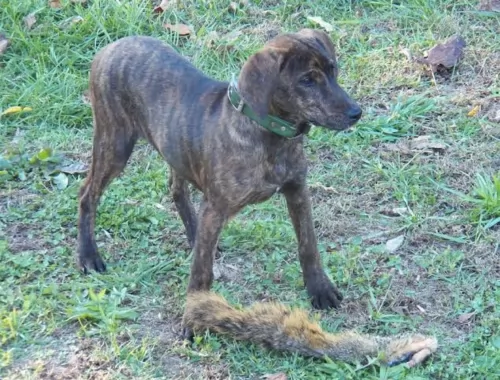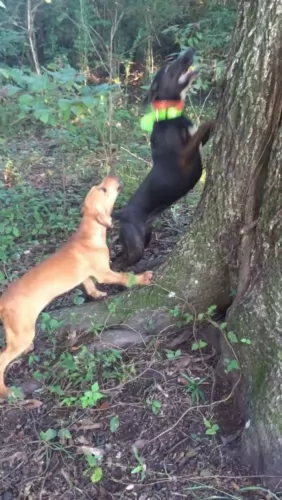 Petzlover
PetzloverKuri is originated from French Polynesia but Treeing Cur is originated from United States. Kuri may grow 15 cm / 5 inches shorter than Treeing Cur. Kuri may weigh 12 kg / 26 pounds lesser than Treeing Cur. Both Kuri and Treeing Cur has almost same life span. Both Kuri and Treeing Cur has same litter size. Both Kuri and Treeing Cur requires Low Maintenance.
Kurī, also known as Guri or Peroor New Zealand Native Dog, is the Maori name for this dog which was introduced to New Zealand by the Maoris when they migrated from East Polynesia around 1280 AD.
They were in fact Polynesian dogs which died out in New Zealand. The Māoris would use the dog as a food source and the skins would be used to make some form of clothing. The bones were used to make items such as necklaces and fish hooks.
Not surprising then that the dog became extinct in New Zealand, with the last known Kuri specimens being found in the Museum of New Zealand Te Papa Tongarewa.
 The Treeing Cur dog is a mixed-breed, working dog which hails from the USA and recognized by the United Kennel Club in November 1998.
The Treeing Cur dog is a mixed-breed, working dog which hails from the USA and recognized by the United Kennel Club in November 1998.
They’ve always been used to tree animals such as squirrels, raccoons, bears, and even mountain lions. They were developed to be used as hunting and guarding dogs.
Aside from these good qualities, today the dog makes an excellent family companion.
The Kuri is extinct now but it was a small to medium sized dog with a thick set neck. He stood between 25 and 46cm and weighed about 13 to 15 kilograms.
He had thick medium-length rough textured hair, small head, erect ears, short legs and a bushy tail. The color of their weatherproof coats varied and some were black, some white or cream and some were a mix of colors and patterns.
An interesting feature about them is that they didn’t bark but instead they howled. They were good at hunting birds.
The Kuri wasn’t considered the brightest breed, but he would have benefited from some training and socialization as this just makes a dog a better pet in every sense – more obedient and better behaved in all situations.
Some Kuris were friendly and able to bond with their human owners, while others were independent and somewhat aloof. Their size would have allowed them to be kept in the city or the country as they weren’t particularly energetic dogs, not requiring much ground to run around in.
 Standing at between 46 – 61cm in height and weighing between 14 – 27kg, the medium-sized Treeing Cur is athletic and muscular.
Standing at between 46 – 61cm in height and weighing between 14 – 27kg, the medium-sized Treeing Cur is athletic and muscular.
He has a short to medium-length double coat that can be in a number of colors. Red and white, tan and white, black and white, brindle, some freckling and bi-colored or tri-colored.
The eyes are mostly brown but can be green or blue too. They’re well-muscled and robust and have medium length floppy ears. The tail is mostly docked but is sometimes left long.
These dogs are alert and intelligent, being easy to train and wanting to please their owners, getting along well with all members of the family, including children and other dogs.
They’re strong-willed dogs and will require training and socialization if you want them to be well behaved wherever they are. He is intelligent so there won’t be any trouble with training him. He is very responsive to what his owner requires of him, with a desire to make their owners pleased with them.
It appears as though some Kuris were kept as pets and that they were able to develop loving relationships with their owners.
We don’t know too much about the extinct Kuri, but scientists are now studying and analyzing the hairs of the dog to find out more about it, and specifically why the Maori dog disappeared some time in the 19th century without a trace.
They will also be analyzing Kuri bones salvaged by archaeologists and which were found on rubbish heaps. These bones can be tested to see whether the diet of the Kuri changed much between the days of Maori settlements and the arrival of the European settlers.
 The Treeing Cur is a working dog that loves all the action. He is an alert, intelligent dog, and being territorial and protective, he makes an excellent guardian dog too.
The Treeing Cur is a working dog that loves all the action. He is an alert, intelligent dog, and being territorial and protective, he makes an excellent guardian dog too.
They can show some aggression towards strangers and other dogs they don’t know. Apart from being an excellent hunting dog, the Treeing Cur loves to be around their human family, making loyal and loving companions.
Some Kuri dogs scavenged while others were pets and ate well. The lifestyle they led would have determined their health. In those days they would have suffered with dental disease, common in adult dogs. Left untreated, dental disease can lead to dental tartar buildup with gum inflammation and tooth loss.
Dental disease can also lead to other organ diseases. These days brushing your dog’s teeth with canine toothpaste and toothbrush can help to ward off dental disease.
Those Kuris that weren’t pets, tried to survive scavenging, and their homeless situation could well have led to ear infections – caused from a wax- and dirt buildup within the ear. He would have been frantic trying to scratch his ears. In modern times, if your dog showed signs of an ear infection, you would need to get him to the vet.
 These dogs are very healthy and you’re not likely to have many vet bills when you bring one into your home.
These dogs are very healthy and you’re not likely to have many vet bills when you bring one into your home.
The Treeing Cur has floppy ears, and particularly if it's a dog that loves swimming, it will battle with moisture in the ears. Dogs with floppy ears don’t have good air-flow inside the ears like a dog with erect ears would have. This means that the dog is prone to ear infections.
This is such a common dog illness that can strike even young dogs. That is why it is important to check your dog over regularly for lumps and bumps on the body. Age increases the risk of cancer, so if you feel an unusual lump on your Treeing Cur, better to have your dog checked out at the vet.
The Kuri will have required regular grooming which means a brushing down twice a week. Brushing would have been useful to prevent loose hairs from shedding with the dog. He would have had to have his ears and eyes checked too to avoid infections. Brushing him would have given his owner the chance to check him over for fleas and ticks too.
As the Kuri wasn’t an overly energetic dog, a walk a day would have kept him content and fit.
The Kuri was a dog that essentially formed part of someone else’s diet. Those that managed to escape being a meal for someone no doubt had to scavenge for food. Because they were used to help people catch birds, they themselves were used to catching birds for themselves.
As a small to medium sized dog, if you were to keep such a dog as a pet you would have given him a cup or two of dried kibble a day and tried to vary his diet by including some home-cooked food and raw meat.
 Being an energetic working dog, this dog isn’t going to be content to be lying around. He is going to need regular exercise. He loves a brisk walk or even a run next to you when you go cycling.
Being an energetic working dog, this dog isn’t going to be content to be lying around. He is going to need regular exercise. He loves a brisk walk or even a run next to you when you go cycling.
When at home, you can consider ball games and hide and seek games with him. They just love to run, and if you live near a park, he will want to be off the leash if possible for some free running and sniffing around.
The short coat of the Treeing Cur will do well with a brush twice a week. While you brush your dog, check him out for ticks and fleas. Also, check him over for any unusual lumps.
Part of his grooming should be to check inside his ears for signs of redness, to make sure his eyes are nice and bright still and to see if he will let you look inside his mouth for bad teeth. Bad teeth can be a source of pain for him.
Caring for your Treeing Cur in a responsible manner means ensuring good food. Such an active dog will require proper nutrients so as to meet his energy and health needs.
Your Treeing Cur will need a high-quality commercially manufactured dog food for active dogs and they will also benefit from other simple cooked foods such as boiled chicken, brown rice and vegetables. The habit of feeding your Treeing Cur human foods such as chocolates, popcorn, peanuts, onions and spices could cause digestive upsets and possible vet fees.